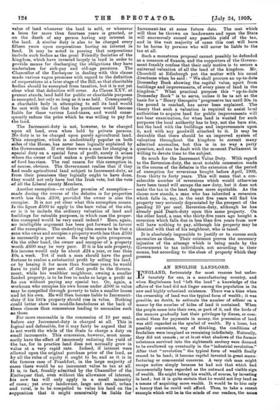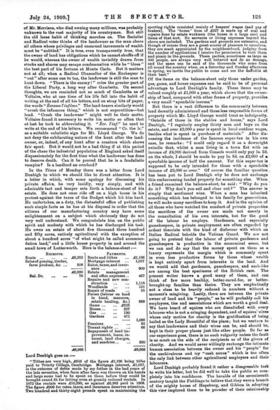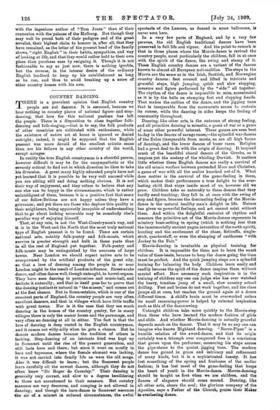AN ENGLISH LANDLORD.
ENGLAND, fortunately for most reasons but unfor- tunately for one, is a manufacturing country, and when Englishmen bad "left the land" a knowledge of the affairs of the land did not linger among the population in its new and highly urbanised existence. There was a time when the ownership of land was the typical form of wealth; it was possible, no doubt, to estimate the number of villani on a manor by the number of hides of land it contained. When the people came into their own, or part of it, and the lords of the manors gradually lost their privileges by disuse, or com- muted them for payments in money, the possession of land was still regarded as the symbol of wealth. By a loose, but possibly convenient, way of thinking, the conditions of feudalism were imagined as remaining indefinitely. Naturally, they did not remain ; or at least what shadows of the former substance survived into the eighteenth century were doomed to be swallowed up eventually in the "industrial revolution." After that " revolution " the typical form of wealth finally ceased to be land; it became capital invested in great manu- facturing or commercial concerns. A very rich man might escape notice simply because he had not that which had immemorially been regarded as the outward and visible sign of wealth. He might betray his wealth, of course, by investing in bind ; but it is quite certain that be would not buy land as a means of acquiring more wealth. It would be to him only a luxury that he could well afford. Thus, to take a recent example which will be in the minds of our readers, the name of Mr. Morrison, who died owning many millions, was probably unknown to the vast majority of his countrymen. But still the old loose habit of thinking marches on. The Socialist and Radical voter thinks of the landowner as the man above all others whose privileges and unearned increments of wealth
must be "nobbled?' It is true, even transparently true, that the owner of land has obligations which he cannot shuffle off if he would, whereas the owner of wealth invisibly drawn from stocks and shares may escape condemnation while be " blues " the beat part of his fortune at Monte Carlo. But it matters not at all; when a Radical Chancellor of the Exchequer is "out" after some one to tax, the landowner is still the man to Lunt down. "There is the enemy!" cries the greater part of the Liberal Party, a long way after Gambetta. On second thoughts, we are reminded not so much of Gambetta as of Voltaire, who at one time of his life fell into the habit of writing at the end of all his letters, and on stray bits of paper, the words "icrasez l'inftime." The land-taxers similarly would " crush the infamous thing," which is not superstition—but land. "Crush the landowner" might well be their motto. Voltaire found it necessary to write his motto so often that at last he took to abbreviating it. ".gcr. l'inf." he used to write at the end of his letters. We recommend "Cr. the lr." as a suitable cabalistic sign for Mr. Lloyd George. We do not deny the exhilarating nature of the hunt after the land- owner, or, indeed, of any hunt after a creature which shows fair sport. But it would not be a bad thing if at this period of the chase the industrial population of England asked itself dispassionately for the first time what the landowner has done to deserve death. Can it be proved that he is a feudalistic vampire? Is a landlord an overlord ?
In the Times of Monday there was a letter from Lord Denbigh to which we should like to direct attention. It is a letter in which, with some apology for discussing his private affairs, he very lucidly, very simply, and with admirable tact and temper sets forth a balance-sheet of his estate. He does not once ride off on a high horse in his protest against the taxes of the Budget which hit him hard. He undertakes, as a duty, the distasteful office of publishing such simple facts as be has at his disposal in order that the citizens of our manufacturing country may have some enlightenment on a subject which obviously they do not very well understand. We congratulate him on the public spirit and modesty with which he has discharged his task.
He owns an estate of about five thousand three hundred and fifty acres, entirely agricultural with the exception of about a hundred acres "of what might be called accommo- dation land," and a little house property in and around the small town of Lutterwortb. Here is the balance-sheet :— PAYMENTS.
Rents and tithes ... Mortgage interest ... Rates, taxes, and insur- ance...
Estate management and office expenses... Repairs and new con- struction ... Woodlands ... Repair of roads Farms (labour on land in hand, manures, estate hauling, &c.) Game ... 4238 House ... ... 227 Gas ... ... 130 Gardens ••• 471 Pensions Tenant rights ...
Repayment of land im- provement, loans, in- terest, land charges, and sundries...
£6,966
Lord Denbigh goes on :—
" Tithes are very high, 4956 of the figure 41,196 being tithe paid to Trinity College, Cambridge. Mortgage interest, 41,057, is the outcome of debts made by my father in the bad years of the late seventies, when farm after farm was thrown on his hands and large sums had to be spent on them before they could be brought round fit for letting even at greatly reduced rentals. In 1872 the rentals were 410,390, as against .46,382 paid in 1908. The figure 4909 for rates, taxes, and insurance deserves attention. Two hundred and thirty-eight pounds spent on maintaining the
Ezczfrrs.
Rents ... 46,382 Sales of grazing, timber, farm produce, &c. ... 508 46,890
Bal. Dr. ••■1111 ••• 76
41,196 1,057 909 427 1,118 121 35 668 1,066 83 66 220 46,966
sporting rights consisted mainly of keepers' wages (and pay of beaters). The 'house' item of 4227 is made up of coal and repairs done by estate workmen (the house is a large one) and items of that sort. No servants or living expenses beyond the above are included. The gardens and grounds are extensive, and though of course they are a great source of pleasure to ourselves, they are much appreciated by the neighbourhood, judging from the number of applications I receive for permission to visit them and picnic in the grounds. These parties, sometimes as large as 300 people, are always very well behaved and do no damage, and the same can be said of the thousands who come from all round the country when, on a Saturday and Sunday afternoon in spring, we invite the public to come and see the daffodils at their best."
Of the items on the balance-sheet only those under garden, gas, game, and house expenses can be said to be of personal advantage to Lord Denbigh's family. These items may be
valued roughly at £1,000 a year, which shows that the owner- ship of land, compared with other forms of property, provides a very small "spendable income."
But there is a vast difference to the community between land decently administered and those less responsible forms of property which Mr. Lloyd George would treat so indulgently.
"Outside of those in the stables and house," says Lord Denbigh, "I regularly employ thirty men and boys on the estate, and over £2,000 a year is spent in local outdoor wages, besides what is spent in purchase of materials." After dis- cussing the incidence of the Income super-tax in his own case, he remarks : "I could only regard it as a downright swindle that, whilst a man living in a town flat with an income of £4,900 derived from Consols would only pay is.
on the whole, I should be made to pay is. 8d. on £2,000 of a spendable income of half the amount. Yet this super-tax is supposed te be only intended for those with a spendable income of 25,000 or over." Of course the familiar question has been put to Lord Denbigh why he does not exchange this embarrassing landed property for something else. When a friend examined the balance-sheet, he said : "Why do you
do it ? Why don't you sell and clear out ? " The answer is simply that sentiment wins. When a man has inherited something which has belonged to his family for generations, he will make many sacrifices to keep it. And in the opinion of all those who have watched the conduct of private properties the sacrifices of the owner are made not merely in the consultation of his own interests, but for the good of the labour he employs. Gardeners, and especially gamekeepers, in private employment are often regarded by ardent theorists with the kind of disfavour with which an Italian Radical beholds the Vatican Guard. We are not going to pretend that the labour of private gardeners and gamekeepers is productive in the economical sense, but we can and do say that the money spent on them as a luxury represents the margin which is commonly spent in even less productive forms by those whose wealth is kept entirely apart from interests in the land. And we would add that gardeners, gamekeepers, and such-like are among the best specimens of the British race. The
present writer knows a good many of them, and can think of few more healthy, better-cared-for, or better-
brought-up families than theirs. They are emphatically not a class to be heavily reduced in numbers without a moment's misgiving. Lastly, there are between the private owner of land and his "people," as he will probably call his employees, ties and associations which are worth a good deal. We have heard of squires who are dissatisfied with every labourer who is not a cringing dependent, and of squires' wives whose only motive for charity is the gratification of being hailed as the Lady Bountiful of the place; but we venture to say that landowners and their wives can be, and should be,
kept in their proper places just like other people. So far as our experience goes, there is no such vulgarity unless the fault is as much on the side of the recipients as of the givers of
charity. And we would never willingly exchange the intimate: human association between the owner and his "people" for the unchivalrous and icy "cash nexus" which is too often the only link between other agricultural employers and their labourers.
Lord Denbigh probably found it rather a disagreeable task to write his letter, but he did well to take the public so com- pletely into his confidence. The heralds of the seventeenth century taught the Fieldings to believe that they were a branch of the mighty house of Hapsburg, and Gibbon in adopting
this view implored them to be prouder of their relationship
with the ingenious author of "Tom Jones" than of their connexion with the palaces of the Hof burg. But though they may well be proud both of their pedigree and of the great novelist, their highest claim to honour is, after all, that they have remained, as the letter of the present head of the family shows, "right English" in their habits, sympathies, and way of looking at life, and that they would rather hold to their own place than purchase ease by resigning it. Though it is not fashionable to say so just now, there is nothing ignoble, but the reverse, in the intense desire of the ordinary English landlord to keep up his establishment as long as he can, and thus to avoid breaking up a score of other country homes with his own.




































 Previous page
Previous page